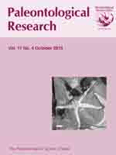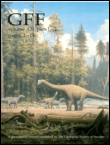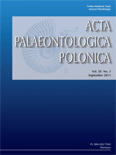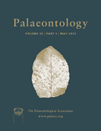
REVISTA BRASILEIRA DE PALEONTOLOGIA
Scope & Guideline
Fostering Collaboration in the Study of Paleontological Wonders
Introduction
Aims and Scopes
- Paleontological Research and Documentation:
The journal publishes extensive studies on fossil organisms, focusing on their identification, classification, and the implications of these findings for understanding biodiversity and evolutionary processes. - Biostratigraphy and Paleoecology:
Articles often investigate the stratigraphic distribution of fossils and reconstruct ancient environments, contributing to a deeper understanding of ecological dynamics through geological time. - Taphonomy and Fossil Preservation:
Research on the processes affecting fossilization, preservation conditions, and the interpretation of fossil assemblages is a critical component of the journal, enhancing knowledge of how fossils inform us about past life. - Regional Paleontology:
A significant emphasis is placed on the paleontological record of Brazil and surrounding regions, documenting local fossil discoveries and their broader implications for global paleontological knowledge. - Interdisciplinary Approaches:
The journal encourages interdisciplinary research that integrates paleontology with other scientific fields, such as geology, biology, and environmental science, to provide holistic insights into past life forms.
Trending and Emerging
- Quaternary Paleontology:
There is a rising interest in Quaternary fossils, particularly those from Brazil, reflecting a broader trend in understanding recent evolutionary changes and their ecological implications. - Taphonomic Studies:
Research examining the processes of fossilization and the environmental conditions affecting fossil preservation is gaining traction, indicating an increased focus on the significance of taphonomy in paleontological research. - Phylogenetic Analyses:
Emerging studies are increasingly utilizing phylogenetic methods to understand the evolutionary relationships among taxa, particularly in vertebrate paleontology, showcasing a modern approach to classification and evolutionary biology. - Microbial Paleontology:
The exploration of microbial components within fossil records is becoming a notable trend, emphasizing the role of microorganisms in ancient ecosystems and their fossilization processes. - Paleoenvironmental Reconstruction:
There is a growing emphasis on reconstructing ancient environments through detailed analyses of fossil assemblages, sedimentology, and isotopic studies, indicating a shift towards understanding ecological dynamics in historical contexts.
Declining or Waning
- Micropaleontology:
There has been a noticeable decrease in publications focusing on micropaleontological studies, such as those involving foraminifera and nannofossils, which previously constituted a significant portion of the journal's output. - Paleoclimatology:
Research articles centered on paleoclimatic reconstructions and their implications for climate change have become less frequent, indicating a potential shift in research priorities within the journal. - Invertebrate Paleontology:
The representation of studies specifically targeting invertebrate fossils, such as corals and mollusks, has diminished, suggesting a move towards vertebrate paleontology and other areas of focus. - Geological Correlation Studies:
The frequency of studies aimed at geological correlation across different regions and formations has waned, possibly reflecting a more localized focus on Brazilian paleontological contexts. - Educational Aspects of Paleontology:
While the journal has previously included articles on the role of paleontology in education, this theme appears to be less prominent in recent issues, indicating a shift towards more research-intensive articles.
Similar Journals

Fossil Record
Connecting Researchers to the Rich Tapestry of Life's HistoryFossil Record is a prestigious open access journal pioneering the field of paleontology, published by Pensoft Publishers in Germany. Since its inception in 1998, it has provided a vital platform for the dissemination of groundbreaking research that advances our understanding of ancient life and environmental change through time. Holding an impressive Q2 quartile ranking in the field and securing a notable position among the top 73rd percentile of paleontological journals, Fossil Record ranks #31 out of 113 in the Scopus classification of Earth and Planetary Sciences. With a commitment to quality and accessibility, the journal not only encourages critical dialogue among researchers, professionals, and students but also promotes the sharing of knowledge worldwide. Explore its comprehensive repository of articles to stay abreast of the latest findings that shape our understanding of the planet’s history.

PALAEONTOGRAPHICA ABTEILUNG A-PALAOZOOLOGIE-STRATIGRAPHIE
Advancing Knowledge: Pioneering Research in Paleobiology and StratigraphyPalaeontographica Abteilung A-Palaozoologie-Stratigraphie is a prominent academic journal that serves as a vital resource for researchers in the fields of Paleontology and Stratigraphy. Published by E Schweizerbart'sche Verlagsbuchhandlung in Germany, this journal has been instrumental in disseminating cutting-edge research from 1996 to 2024. With an established reputation highlighted by its Q3 ranking in both Paleontology and Stratigraphy, it ranks 26th among 113 journals in Paleontology and 15th among 55 in Stratigraphy, showcasing its significance within the scientific community. Although it does not currently offer open access, the journal provides an invaluable platform for the exchange of innovative ideas and findings in paleobiological and stratigraphic studies. As such, Palaeontographica continues to attract contributions from leading academics, making it an indispensable publication for professionals and students alike who are eager to advance their understanding of Earth's historical biological and geological patterns.

Stratigraphy
Advancing the Science of Earth's LayersStratigraphy is a distinguished journal dedicated to advancing the field of paleontology and stratigraphic research. Published by MICRO PRESS in the United States, this journal is accessible via its ISSN 1547-139X and E-ISSN 2331-656X, providing an essential platform for researchers, professionals, and students alike. With a robust focus on the intricate relationships between geological time and the fossil record, Stratigraphy aims to disseminate high-quality research that enhances our understanding of Earth’s history. Its ranking within the 2023 Q2 category of paleontology reflects its commitment to scholarly excellence, as noted by a Scopus ranking of #65 out of 113 in the Earth and Planetary Sciences domain, placing it in the 42nd percentile. Although not open access, the journal's valuable contributions from 1988 to 2024 encourage a collaborative dialogue among the scientific community, underscoring the significance of stratigraphic studies in environmental and evolutionary research.

PALEONTOLOGICAL RESEARCH
Unveiling Earth's Ancient Secrets.PALEONTOLOGICAL RESEARCH, published by the PALAEONTOLOGICAL SOCIETY OF JAPAN, is a prominent peer-reviewed journal that addresses key developments in the field of paleontology, ecology, and evolutionary biology. With an ISSN of 1342-8144, this journal has established itself as a vital resource for researchers and professionals who seek to explore the intricate history of life on Earth, integrating insights into evolutionary dynamics and ecological frameworks. Operating since 1997 and with content converging up to 2023, PALEONTOLOGICAL RESEARCH occupies a notable position, ranked in the second quartile within both Ecology, Evolution, Behavior and Systematics and Paleontology categories. While it is not an open-access journal, its rich repository of studies significantly contributes to the academic community. Researchers and students engaged in the exploration of ancient ecosystems and their implications for current biodiversity are sure to find valuable insights within its pages, reinforcing the journal's importance as a leading platform for disseminating paleontological knowledge in Japan and beyond.

GFF
Elevating Research Standards in Geology and Paleontology.GFF is a prestigious academic journal dedicated to advancing research in the fields of Geology and Paleontology. Published by Taylor & Francis Ltd in the United Kingdom, GFF serves as a vital platform for disseminating innovative findings and fostering discussions among researchers, professionals, and students alike. With a noteworthy impact factor reflecting its significance in the scientific community, GFF has achieved Q2 ranking in both Geology and Paleontology, underscoring its commitment to high-quality scholarship. The journal has been operational since 1872, accumulating a rich history of contributing to our understanding of earth sciences. It currently ranks #133 out of 321 in Earth and Planetary Sciences - Geology, and #50 out of 113 in Paleontology according to Scopus rankings. Although it does not offer an open access option, GFF remains accessible through various academic databases, ensuring that cutting-edge research reaches a wide audience. Its comprehensive scope aims to explore critical advancements in geological and paleontological sciences, making it an essential resource for those committed to exploring the intricacies of our planet’s past and present.

Swiss Journal of Palaeontology
Revealing the Mysteries of Earth's Prehistoric LifeSwiss Journal of Palaeontology, published by SPRINGER INT PUBL AG, stands as a leading platform for innovative research within the field of paleontology, contributing significantly to the understanding of Earth's historical life forms and their evolutionary pathways. With its ISSN 1664-2376 and E-ISSN 1664-2384, this journal has established a strong presence in academic circles, recognized as a Q1 journal in the category of Paleontology for 2023. Moreover, it ranks 20th out of 113 in the Earth and Planetary Sciences, securing an impressive 82nd percentile on Scopus, underscoring its influence and reach in the scientific community. The journal publishes cutting-edge research findings, theoretical advancements, and comprehensive reviews that span the globe, making it an essential resource for researchers, professionals, and students in the paleontological sciences. For those interested in contributing to and learning from the latest discoveries, the Swiss Journal of Palaeontology promises to be an invaluable addition to your academic library.

ACTA PALAEONTOLOGICA POLONICA
Bridging the Past and Present of Life on EarthACTA PALAEONTOLOGICA POLONICA is a leading scholarly journal in the field of paleontology, published by the Institute of Paleobiology, Polish Academy of Sciences. With its open access model established since 1956, the journal ensures that vital research related to Earth's history and the evolution of life is freely accessible to a global audience. Based in Warsaw, Poland, this journal has garnered a respectable impact within the academic community, currently positioned in the Q2 quartile of its field and ranking #47 out of 113 in Scopus for Earth and Planetary Sciences, reflecting its significance in advancing paleontological research. Covering a wide range of topics related to fossil studies and evolutionary biology, ACTA PALAEONTOLOGICA POLONICA serves as a crucial platform for researchers, professionals, and students alike, encouraging the dissemination of innovative ideas and discussions that contribute to our understanding of past life on Earth. As it continues to publish high-quality articles through to 2024 and beyond, this journal remains integral to the ongoing discourse in paleontological sciences.

CARNETS DE GEOLOGIE
Unveiling Earth's Secrets, One Study at a TimeCarnets de Geologie is a prominent open-access journal dedicated to the dynamic fields of geology, paleontology, and stratigraphy. Published by Carnets Geologie and based in France, the journal has been a platform for scholarly communication since 2002, facilitating unrestricted access to high-quality research. With a robust impact reflected in its 2023 quartile rankings—Q2 in Geology, Paleontology, and Stratigraphy—Carnets de Geologie ranks favorably within Scopus, positioning itself at the 60th percentile for Earth and Planetary Sciences. The journal aims to disseminate innovative research findings and foster academic discourse among researchers, professionals, and students interested in the intricate aspects of Earth's history and processes. Encompassing a broad scope that reflects continuous developments in the geological sciences, Carnets de Geologie is dedicated to advancing knowledge and understanding within its community.

PALAEONTOLOGY
Exploring Fossilized Legacies for a Deeper TomorrowPALAEONTOLOGY, published by Wiley in the United Kingdom, is a leading journal dedicated to advancing the knowledge of Earth's biological history through the study of fossilized remains. With an ISSN of 0031-0239 and an E-ISSN of 1475-4983, this journal has established itself as a premier resource in the field, boasting a remarkable Q1 ranking in both Paleontology and Ecology, Evolution, Behavior and Systematics according to the 2023 category quartiles. Its commitment to high-quality research is evidenced by its Scopus rankings, placing it in the 93rd percentile among paleontology journals. While PALAEONTOLOGY is not currently open access, its extensive archival reach from 1979 to 2024 ensures that vital research findings remain accessible to the academic community. This journal not only acts as a platform for cutting-edge research but also fosters collaboration among scientists, students, and professionals interested in the implications of paleontological studies on contemporary ecological and evolutionary issues.

PALAEONTOLOGIA ELECTRONICA
Championing Open Science in Paleontology and BeyondPALAEONTOLOGIA ELECTRONICA is a distinguished open-access journal published by COQUINA PRESS, offering a vital platform for the dissemination of cutting-edge research in the fields of Paleontology and Oceanography. Launched in 1998, this journal has continuously fostered scholarly communication, allowing unrestricted access to scientific findings and contributing significantly to the advancement of the field. With an impressive track record since its inception, PALAEONTOLOGIA ELECTRONICA holds a 2023 Scopus ranking of #39 out of 113 in the Paleontology category, demonstrating its value among academic resources as evidenced by its Q2 quartile ranking. The journal is based in the United States, and it encourages submissions that span a diverse range of topics, from fossil analysis to evolutionary biology. As a prominent resource for researchers, educators, and students alike, it plays a crucial role in shaping the future of paleontological study.